Emotional Intelligence (EQ) Training Course in South Africa
Our corporate training course is also available in Johannesburg, Cape Town, Durban, Pretoria, Port Elizabeth, Pietermaritzburg, Benoni, Tembisa, Vereeniging, Bloemfontein, Soweto, East London, Polokwane, Krugersdorp, Rustenburg, Witbank, Nelspruit, Alberton, Midrand, Upington, Middelburg, George, Somerset West, Vanderbijlpark, Worcester, Port Shepstone, Potchefstroom, Brakpan, Springs, Uitenhage, Stellenbosch, Franschhoek, Knysna, Hermanus, Hout Bay, Plettenberg Bay, Mossel Bay, Oudtshoorn, Clarens, Jeffrey’s Bay.
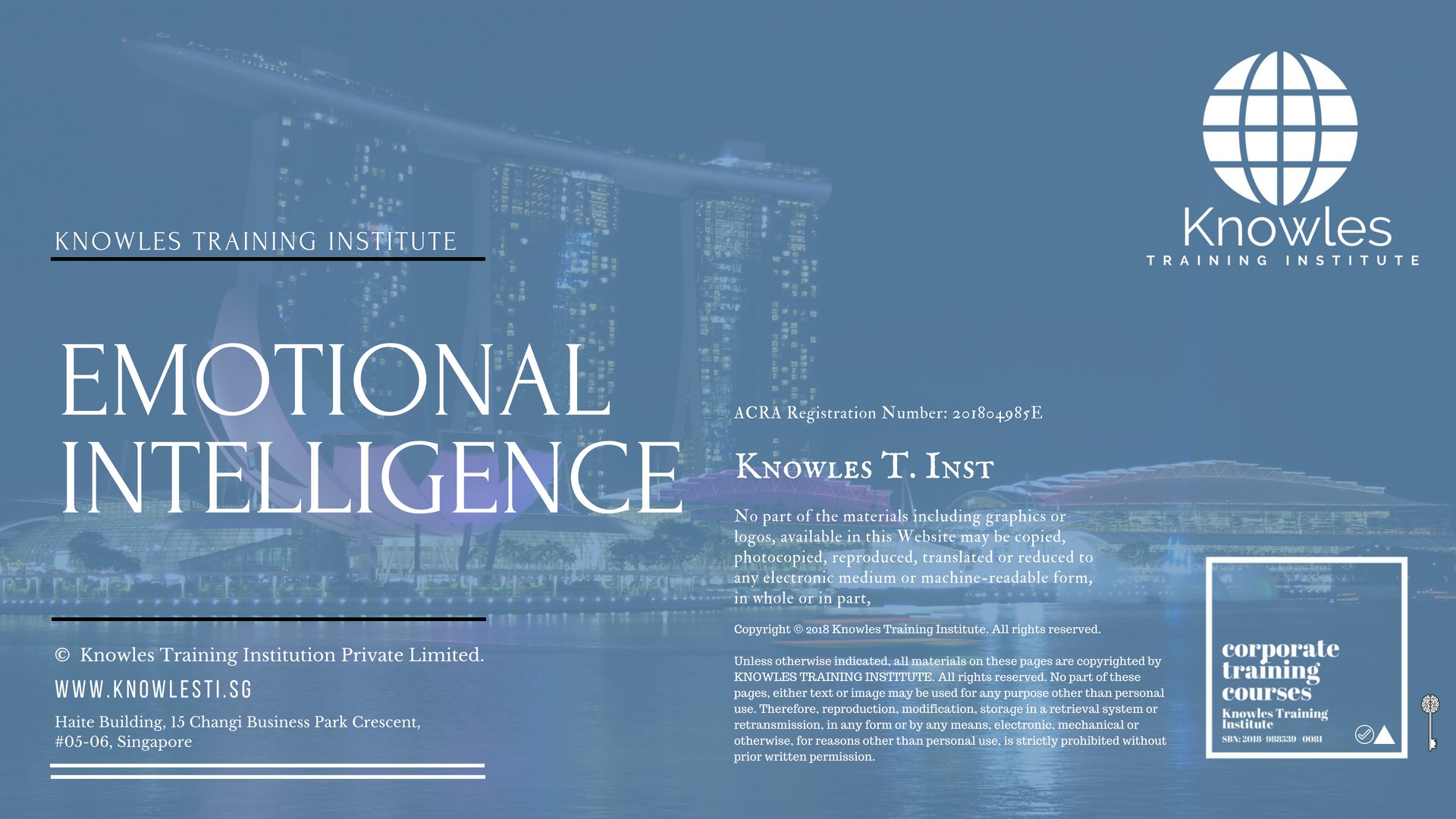
About This Emotional Intelligence Training Course in South Africa
Emotional Intelligence (EQ) Course in South Africa
Emotional intelligence (EQ) is having the ability to efficiently perceive, manage, and compare emotions in yourself as well as in others. To be emotionally sensible approach directing your feelings in top-rated ways to alleviate pressure and anxiety in diverse conditions. moreover, it’s about the use of your feelings to overcome existence troubles in a peaceful and managed manner. To be emotionally shrewd manner having the capacity to empathize with others, which in the end lets you higher recognize human beings deepest needs.
Emotional intelligence is a ready conversation and social interaction. particularly, it’s approximately directing your feelings in most efficient ways that help you talk efficiently with others the use of verbal and nonverbal cues. The fee of having emotional intelligence extends past the “self” and undoubtedly influences the relationships we’ve with others. In truth, all people we interact with blessings. They benefit because of how we communicate with them. An emotionally sensible person understands how to defuse struggle in rational approaches to fixing relationships, which ultimately enables construct deeper tiers of trust.
You display emotional intelligence whilst you become aware of the emotions you are experiencing. but, recognition is most effective a start. You must additionally display which you understand those feelings and the impact that they have got to your kingdom-of-thoughts. moreover, you need to understand how your emotions are affecting the human beings around you.
This emotional intelligence education route addresses our very own Emotional Intelligence (EQ) and how we will better recognize ourselves and interpret others.it focuses on 4 key regions; self-awareness, self-control, social consciousness, social management and it’s going to provide you with the capabilities to be more self-aware and select to control your reactions. It additionally gives you the competencies to assess other’s emotions greater efficiently and deal with them correctly for superior performance.
Who Should Attend This Emotional Intelligence Training Course in South Africa Workshop
This Emotional Intelligence Training Course in South Africa workshop is ideal for anyone who would like to gain a strong grasp and improve their Emotional Intelligence.
All Staff Within An Organisation
Managers
Team Leaders
Executives
Assistants
Officers
Secretaries
Group Size For This Emotional Intelligence Training Program in South Africa
The ideal group size for this Emotional Intelligence course in South Africa is:
Minimum: 5 Participants
Maximum: 15 Participants
Course Duration For This Emotional Intelligence Skills Course in South Africa
The duration of this Emotional Intelligence Training Course in South Africa workshop is 2 full days. Knowles Training Institute South Africa will also be able to contextualised this workshop according to different durations; 3 full days, 1 day, half day, 90 minutes and 60 minutes.
2 Full Days
9 a.m to 5 p.m
Emotional Intelligence Course in South Africa Benefits
Below is the list of course benefits of our Emotional Intelligence course in South Africa
Emotional Intelligence Training Course in South Africa Benefits- Part 1
- Improve rapport with people.
- Understand the non-verbal expression more efficiently.
Emotional Intelligence Training Course in South Africa Benefits- Part 2
- Signify of motivations and behaviours and determine to acknowledge the distinction.
- Achieve and manage people more efficiently by perception.
Emotional Intelligence Training Course in South Africa Benefits- Part 3
- Maintain a communication pattern to produce more emotionally charged discussions.
- Be aware of your own emotions and how to control and express them effectively.
Emotional Intelligence Training Course in South Africa Benefits- Part 4
- Handle interpersonal relationships empathetically.
- Increase your own leadership ability.
Emotional Intelligence Training Course in South Africa Benefits- Part 5
- Improves your decision-making capability.
- Raise your personal well-being and those around you.
- Identify and manage the emotions of those around you.
Emotional Intelligence Course in South Africa Objectives
Below is the list of course objectives of our Emotional Intelligence course Course in South Africa
Emotional Intelligence Course in South Africa Objectives – Part 1
- Determine and practice self-management, self-regulation, self-awareness, self-motivation, and empathy.
- Understand, use and manage your emotions.
Emotional Intelligence Course in South Africa Objectives – Part 2
- State how to verbally communicate with others in the most effective way possible using EQ.
- Explain how to successfully communicate with others in a non-verbal way.
Emotional Intelligence Course in South Africa Objectives – Part 3
- Recognise the advantages of emotional intelligence.
- Associate emotional intelligence to the workplace.
Emotional Intelligence Course in South Africa Objectives – Part 4
- Learn to balance optimism and pessimism.
- State how to effectively impact others.
Course Content For This Emotional Intelligence Training Course in South Africa
Below is the list of course content of our Emotional Intelligence training course in South Africa
Emotional Intelligence Course in South Africa – Part 1
- Emotional Intelligence: Self-Management
- To efficiently achieve your overall career objectives or the objectives in a given task, you must use explicitly defined processes to carry out those activities.
- Emotional Intelligence: Self-Awareness
- Being ‘aware’ of one’s self is the capacity to correctly recognise one’s skills and knowledge, importance and abilities.
- Emotional Intelligence: Self-Regulation
- Self-Regulation is a different term for ‘self-control’, which is defined as the capacity to manage one’s emotions, desires, and behaviours to achieve a positive result.
Emotional Intelligence Course in South Africa – Part 2
- Emotional Intelligence: Self-Motivation
- Andrew Carnegie said it great with this quote “People who are unable to motivate themselves must be content with mediocrity, no matter how impressive their other talents.”
- Empathy
- Empathy is sharing the feelings of others. It is a good trait. For empathy to work, an individual need to be able to identify, analyse, and understand their own emotions.
- How to accurately perceive emotional intelligence?
- People tend to communicate only half of the information they are trying to get across.
Emotional Intelligence Course in South Africa – Part 3
- Use Emotions to Facilitate Thinking
- Learn how to use emotions to promote thinking’
- Manage Emotions
- Understanding what emotion you are exhibiting or knowing the cause for that emotion is not sufficient to manage your emotions.
- Focused Listening
- One of the most dependable methods to convince someone that you are genuinely listening to what they are saying is to listen intently. Learn how to in this section.
Emotional Intelligence Course in South Africa – Part 4
- Asking Questions
- Asking probing questions is a component that goes hand-in-hand with focused listening.
- Communicating with Flexibility and Authenticity
- Learn how to communicate with authenticity.
- Body Language
- Actions speak louder than words. Learn effective body language strategies.
Emotional Intelligence Course in South Africa – Part 5
- It’s Not What You Say, It’s How You Say It
- It is necessary to be conscious of your body language, emotions, tone, pitch, and rate when you speak.
- Benefits of Emotional Intelligence
- List some of the main benefits of emotional intelligence in a professional and personal context.
- Articulate your Emotions Using Language
- Learn appropriate emotions for the workplace.
Emotional Intelligence Course in South Africa – Part 6
- Seeing the Other Side
- People that know you are the best judge.
- Self-Management and Self-Awareness
- Self-management can sometimes be a difficult condition to tame.
- Giving in Without giving Up
- Compromising is a necessary part of dealing with others in both the business world and in personal relationships.
Emotional Intelligence Course in South Africa – Part 7
- Using Coping Thoughts
- Learn how to overcome the potential anxiety of the issue at hand.
- Using Relaxation Techniques
- Relaxation methods are not just practised to help you ‘feel better’.
- Bringing it All Together
- Learn efficient ways to relax and take control of stressful situations.
Emotional Intelligence Course in South Africa – Part 8
- Understand Emotions and How to Manage Them in the Workplace
- Recognising one’s feelings and learning how to use them is the efficiency of each person.
- Role of Emotional Intelligence at Work
- Both social and personal proficiency are obtained as a result of Emotional Intelligence.
- Disagreeing Constructively
- To oppose constructively means to do so in a positive, fruitful manner.
Emotional Intelligence Course in South Africa – Part 9
- Optimism
- Owning the quality of ‘optimism’ is the ability to find the bright side of every circumstance.
- Pessimism
- Pessimism is the exact opposite of optimism.
- The Balance Between Optimism and Pessimism
- How to find the balance.
Emotional Intelligence Course in South Africa – Part 10
- Creating a Powerful First Impression
- The impression one leaves can be the difference between being liked or hated.
- Assessing a Situation
- Learn how to access a situation effectively.
- Being Zealous without Being Offensive
- Being a zealous person is a great characteristic, but being overly zealous can have an adverse reaction.
Emotional Intelligence Course in South Africa Value Added Materials
Each participant will receive the following materials for the Emotional Intelligence course in South Africa
Emotional Intelligence Course in South Africa Learner’s Guide
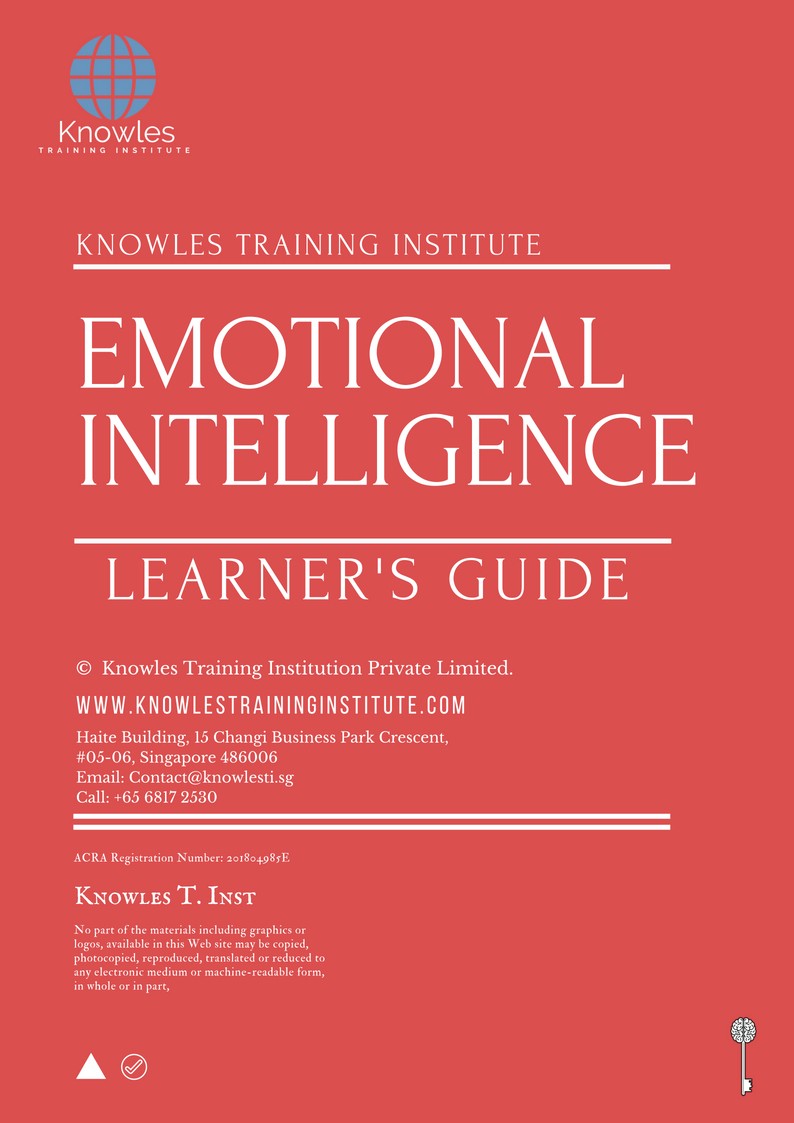
Emotional Intelligence Course in South Africa Handouts
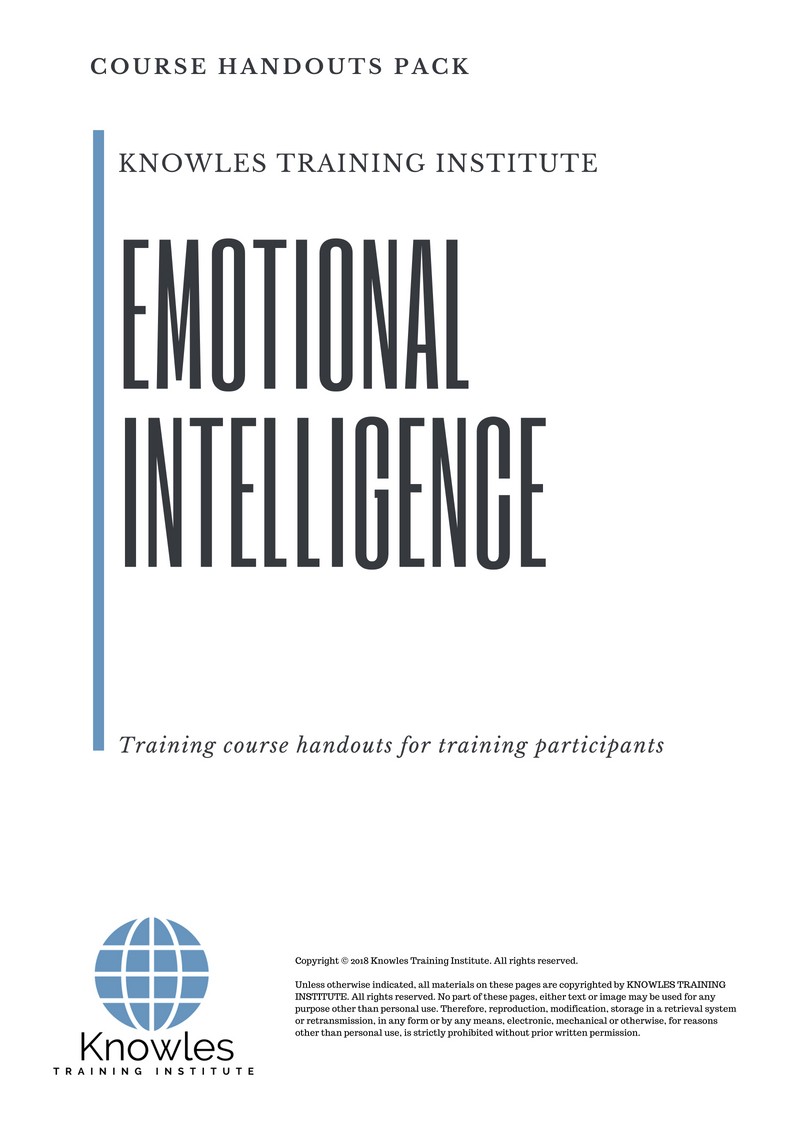
Emotional Intelligence Course in South Africa PPT Slides Used During Course
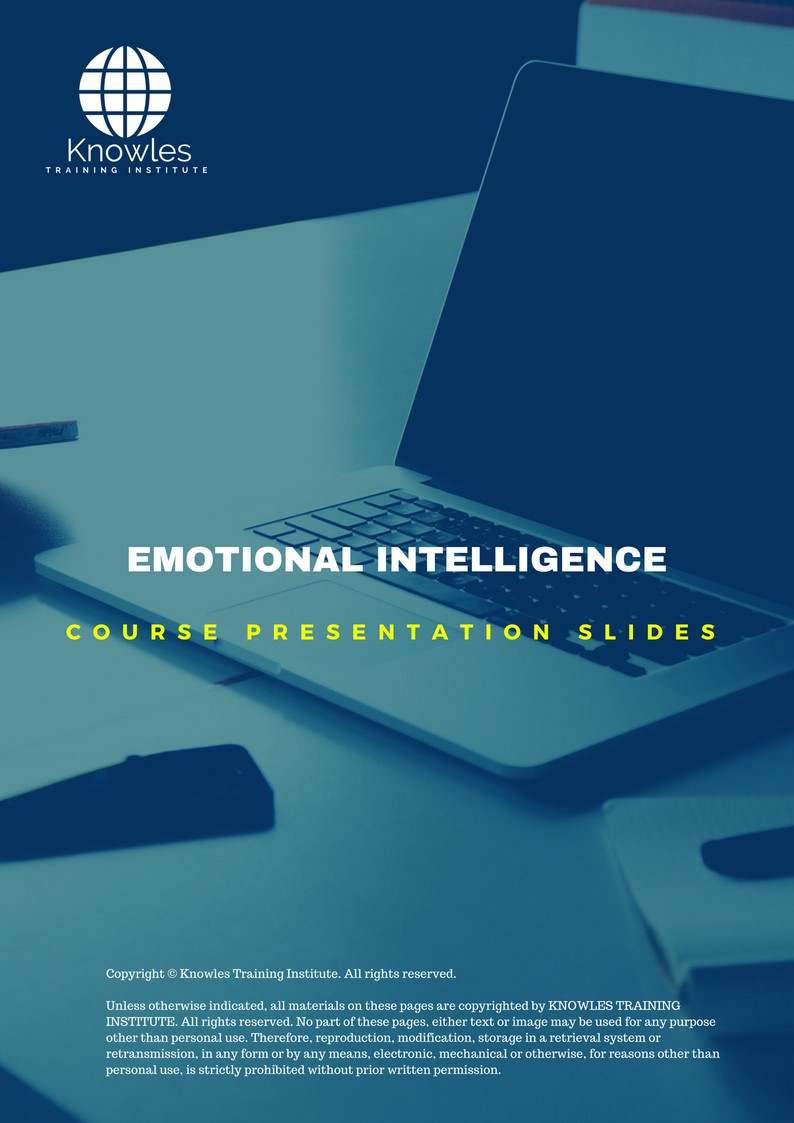
Emotional Intelligence Training Course in South Africa Certification
Each course participant will receive a certification of training completion
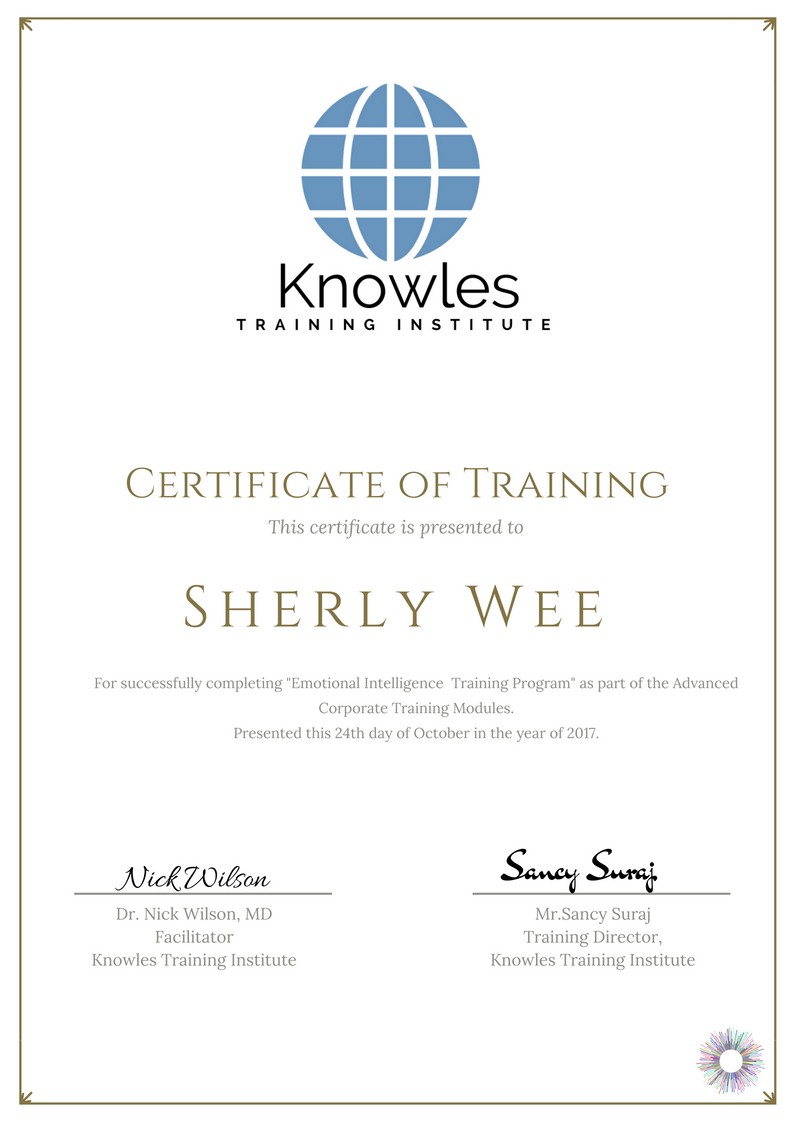
Course Fees For Emotional Intelligence (EQ) Course in South Africa
There are 4 pricing options available for this Emotional Intelligence training course in South Africa. Course participants not in South Africa may choose to sign up for our online Emotional Intelligence training course in South Africa.
USD 679.97 For a 60-minute Lunch Talk Session.
USD 259.97 For a Half Day Course Per Participant.
USD 419.97 For a 1 Day Course Per Participant.
USD 569.97 For a 2 Day Course Per Participant.
Discounts available for more than 2 participants.
Upcoming Emotional Intelligence Training Course in South Africa Schedule
Contact us for the latest Emotional Intelligence course in South Africa schedules:
Email: contact@knowlesti.co.za
Message:
Download Emotional Intelligence Course in South Africa Brochure
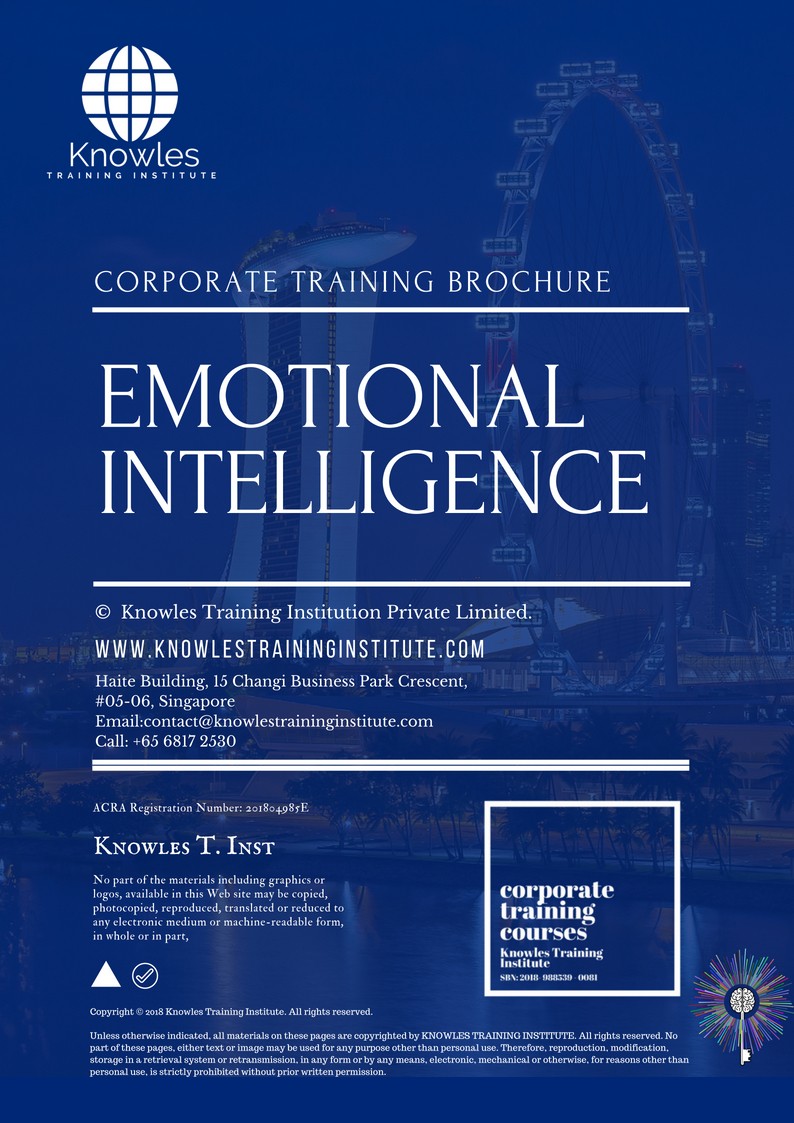
Request for this Emotional Intelligence course in South Africa brochure. Fill up the short information below and we will send it to you right away!
Post Training Support: A vast majority of training does not have any effect beyond 120 days. To work, training has to have a strong pre- and post-training component. Post-training reinforcement helps individuals to recall the understanding and ask questions.
Blended Learning: Learning does not occur in the classroom. Virtually everybody prefers distinct ways of learning. Successful learning should have a multi-channel, multi-modal strategy.
- We Understand The Industry: We’ve got a profound comprehension of the business, business design, challenges, strategy and the that our participants are in and have designed the courseware to cater to their professional needs.
- Course Content: Knowles Training Institute’s material is relevant, of high quality and provide specific learning results. Participants will leave the training course feeling as they have gained a strong understanding and will also be in a position to execute what they have learned sensibly.
Course Development — The workshop modules follow a systematic and logical arrangement. This structure helps to ensure that the course material allows the facilitators to deliver the course in a logical arrangement. Consider the subjects as building bricks into learning, our facilitators slowly build towards a comprehensive picture of this entire topic.


Course Enquiries

Fill up the form and we will get back to you in less than 1 working day.
Alternatively, give us a call to have one of our training consultants contact you. Our corporate training courses can be contextualized to meet your organization’s training needs. Leverage on our large pool of professional trainers and consultants for your organization’s training needs.
Email: contact@knowlesti.co.za
We Guarantee 100% Privacy. We Respect Your Privacy. Your Information Will Never Be Shared.


